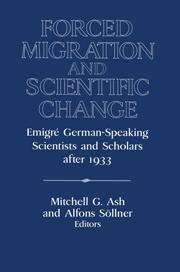Book contents
- Frontmatter
- Introduction: Forced Migration and Scientific Change after 1933
- PART ONE PHYSICAL AND MEDICAL SCIENCES
- PART TWO PSYCHOLOGY, PSYCHONALYSIS, PEDAGOGY
- 5 Emigré Psychologists after 1933: The Cultural Coding of Scientific and Professional Practices
- 6 Psychoanalytic Science: From Oedipus to Culture
- 7 The Impact of Emigration on German Pedagogy
- PART THREE SOCIAL SCIENCES
- Epilogue: The Refugee Scholar in America: The Case of Paul Tillich
- Index
7 - The Impact of Emigration on German Pedagogy
Published online by Cambridge University Press: 05 January 2013
- Frontmatter
- Introduction: Forced Migration and Scientific Change after 1933
- PART ONE PHYSICAL AND MEDICAL SCIENCES
- PART TWO PSYCHOLOGY, PSYCHONALYSIS, PEDAGOGY
- 5 Emigré Psychologists after 1933: The Cultural Coding of Scientific and Professional Practices
- 6 Psychoanalytic Science: From Oedipus to Culture
- 7 The Impact of Emigration on German Pedagogy
- PART THREE SOCIAL SCIENCES
- Epilogue: The Refugee Scholar in America: The Case of Paul Tillich
- Index
Summary
Of all the academic disciplines, pedagogy is the one least familiar to emigration researchers in Germany and elsewhere. Although studies and discussions devoted to education specialists working on a practical level are by no means unknown, the subject has gained neither widespread currency nor a reputation as a scholarly discipline. Despite the lack of such a reputation - even to this day - pedagogy in Germany has grown continuously and taken on a much more prominent role over the course of the twentieth century. Historically, the teaching of pedagogy as a theoretical subject began outside the universities in teacher training seminars in the early nineteenth century, and from there spread to colleges of education and similar institutions in the twentieth century. Since the period 1900 to 1920, it has been taught in an applied form at specialized institutions of higher education or Fachhochschulen - for example, in the training of social workers and vocational teachers.
With its development, pedagogy has contributed significantly to the German academic and professional scene as the basis for a large number of teaching and educational professions and as a discipline in its own right. Therefore, when studying the emigration of German scientists and scholars, we ignore pedagogy at our own peril. By looking at it, we can show the impact of emigration in a specific case - namely, on a discipline that had not yet gained a firm academic footing by 1933. Beyond this specific case, we can also observe the consequences of emigration for the social sciences and the humanities more generally.
- Type
- Chapter
- Information
- Forced Migration and Scientific ChangeEmigré German-Speaking Scientists and Scholars after 1933, pp. 156 - 172Publisher: Cambridge University PressPrint publication year: 1996



